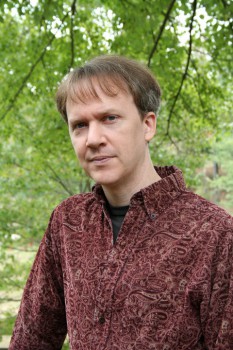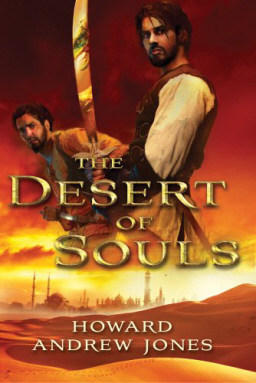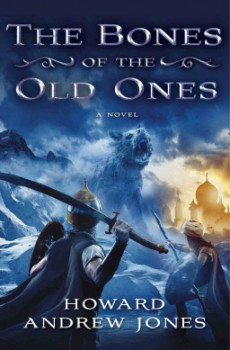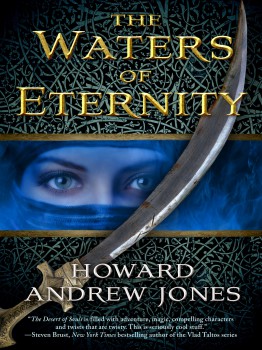The Best of Modern Arabian Fantasy, Part I: Howard Andrew Jones and The Desert of Souls
 The Middle East has produced some world famous mythology and is fertile ground to base a fantasy novel, as more and more authors are discovering. Over the next several posts I will be exploring this modern day trend and interviewing many of the authors who are mining the lore and culture of the Middle East, and specifically the Arabian Middle East for their work.
The Middle East has produced some world famous mythology and is fertile ground to base a fantasy novel, as more and more authors are discovering. Over the next several posts I will be exploring this modern day trend and interviewing many of the authors who are mining the lore and culture of the Middle East, and specifically the Arabian Middle East for their work.
My first interviewee is Howard Andrew Jones who sets his novel, The Desert of Souls, in the 8th Century, when the Abbasid caliphate was a center of trade, culture, and learning. In the following interview, I’ve asked Howard what drew him to this particular cultural milieu and how he went about doing the research necessary to create characters and compose their adventures.
Interview with Howard Andrew Jones
Conducted and edited by Emily Mah, April, 2012
Emily Mah: What inspired you to write fantasy set in the Middle East?
Howard Jones: I fell in love with the time period, the setting, the people who lived there, and the literature that they wrote. I was first introduced to non-western narrators by the great historical fiction writer Harold Lamb, and, later, by Robert E. Howard’s excellent historicals. And I was inspired to investigate the Arabian Nights as an adult by issue 50 of Neil Gaiman’s Sandman, which was set in 8th century Baghdad. I read a few more “westerners writing about the east” style sources (including some very fine overviews in some role-playing games, of all places) then started in on the actual literature, and translated histories and accounts written by Arab historians and chroniclers. By the time I read Usamah ibn Munqidh’s memoirs I was well and truly hooked.
 How did you set about doing research for The Desert of Souls?
How did you set about doing research for The Desert of Souls?
Piecemeal, over many years. I have been writing short stories about Dabir and Asim for more than a decade, continually researching the time period, the biographies of the people who lived then, and reading and re-reading the literature. I wish I could say that it was a systematic effort. Really, though, I was simply fascinated with what I was finding, and couldn’t stop. I’m still doing it. Because of this, when I sat down to write The Desert of Souls I knew the characters and the setting quite well already although I did have to spend some time looking into the culture of the Bedouins, the Marsh Arabs, and the city of Basra.
A lot of people are familiar with Arabian Nights and stories such as Aladdin that have been retold to Western audiences. Are there other, lesser known stories or lore that you’d recommend to someone who’s interested in learning about this cultural milieu?
You bet – the aforementioned An Arab-Syrian Gentleman and Warrior in the Period of the Crusades (Usamah Ibn Munqidh ) is one of my very favorite books, period. It is the fascinating memoir of a nonagenarian warrior and one-time adviser to Saladin. It rambles a bit from tale to tale, but most of them are so fascinating that you don’t mind, and those memories that aren’t as interesting are over so fast that you scarcely notice. As much as The 1001 Nights deserve celebration, readers should also familiarize themselves with the great Persian epic poem, The Shanameh, by Abolqasem Ferdowsi. And then there are the delightful Aesop-like fables of Kalila and Dimna. It is likely that they actually pre-date Aseop’s Fables. There are many more sources, not the least of which is the Koran itself, rightly lauded for the soaring beauty of its language.
Can you give us a thumbnail sketch of the time period and the historical events of the time?
Well, a thumbnail can’t do it justice. The 8th century Abbasid caliphate was comparable in many ways to Renaissance Europe because it was undergoing a fabulous expansion in all manner of fields — literature, science, and mathematics. The middle class was growing, and merchants prospered and brought in fabulous items from distant lands. A talented and enterprising commoner might rise very high indeed. In later years the 8th century was looked upon as a golden age, especially the time of Harun al-Rashid, even though the rule of one of his sons, Al Ma’mun , was probably more enlightened.
So have all of your Arabian fantasy stories taken place during the 8th century, or have you set stories in other time periods?

All of them are set near the end of the 8th century, featuring Dabir and Asim. Right now I don’t have plans to write about anyone else in the time period, or in any nearby centuries. The rest of the fiction I’ve published or have a mind to write is secondary world fantasy, not historical.
After finishing The Desert of Souls, I’m curious about the Magians. Can you give a brief description of this sect and tell of what kind of research you did to learn about them?
I wish I could refer you to a mighty tome that concerns them, but I’ve only ever found dribs and drabs in other books. My first scholarly reading about the subject came from a book titled The Persian Empire, by J.M. Cook, but it is by no means the most authoritative source. That book launched my investigation into the prophet Zoroaster, or Zarathrustra, and his teachings. To try and get into the history of how Magian was confounded with the idea of mages and wise men and how the religion apparently began as what may have been the first monotheistic religion and then was later changed to one of lopsided balance between the God of righteousness (Ahura Mazda) and the weaker Angra Mainyu, or Ahriman, would take a very long time. Ahriman may have simply begun as a concept (“the lie,” or falsehood) that was later personified into an evil deity. Those who are interested will find a lot of fascinating reading. There are perhaps a half a million people alive today who still follow the teachings of Zarathustra.
How did Arabian lore shape the magic system in your book? Are there any stories or concepts you found in your research that especially captivated you?
I suppose the easiest answer is that I immersed myself in the stories for a number of years, and this is what came bubbling out. I didn’t deliberately echo the magic of any one story; I tried, instead, to emulate the feel of them. I also played with some of the conventions. For instance, while a djinn is summoned, I did not necessarily have it called in typical way, or have it residing within a magic lamp. As for particular stories, I was always quite taken with the flights of fancy in The Ebony Horse, and some moments of horror and surprise in The City of Brass, along with many others from The Arabian Nights. And then there is the frightful King Zahhak from The Shahnameh, who was kissed on the shoulders by Satan and left with a dreadful curse. I could go on and on.
I know you’ve said you’d like to read some Arabic works in the original Arabic. Have you studied Arabic?
Yes, but I have barely dipped my toe in the water. I’ve never been a quick study when it comes to languages, and I just couldn’t keep up the language course while teaching four classes and writing. Now that I’m no longer teaching I hope to try again, perhaps this fall.
 Going back to your book, The Desert of Souls, where else can a reader find Dabir and Asim stories? Have you got other novels in the series yet to come out?
Going back to your book, The Desert of Souls, where else can a reader find Dabir and Asim stories? Have you got other novels in the series yet to come out?
I’ve signed on for four novels of Dabir and Asim. The second one has been turned over to the publisher and is scheduled to be printed in August or September of 2012. I’ve started work on the third. Right now I’m planning on all of them being standalone. They’re written in chronological sequence, but each is complete in and of itself. Most of the short stories have been collected as an e-book through St. Martin’s/Thomas Dunne (The Waters of Eternity) and can be downloaded to your e-reader from any number of venues.
How difficult was it for you, a Westerner, to get into the mindset of the Middle East? Is this something that’s happened gradually over all your years of research or is it something that requires conscious effort? What steps do you take to ensure the authenticity of your books; is it all research you do yourself or do you enlist the help of others?
I work hard to be aware of the viewpoint I bring with me, and I am always searching for more details to bring the ancient Middle East and its people to life. That depiction is a little stylized and glamorized, for these are adventure stories, but none of the characters are intended to be stereotypes. As to getting into the mindset, I feel like I fell into the mindset when I fell in love with the history, the narratives, and the prose of the time. Harold Lamb once wrote that the Arab chroniclers of the Crusades were far more human and interesting than the dry, monkish annals told by the west, and its that humanity that charmed and fascinated me when I began to read of Baghdad’s golden age. It didn’t even occur to me to try and write a story from the viewpoint of an 8th century Arabian until I could clearly “hear” the sound of Asim’s narrative. There he was, character and tone set, ready to start telling me stories, so I decided to try. Consciously there are some kinds of stories I have little to no interest in telling in this setting. I have no intention of examining or critiquing religion or social attitudes of the time, and I may sometimes “turn the camera away” from some of the more brutal challenges of the period. Life was hard in the 8th century, for people of any culture. It is my goal to recreate the feel of a storyteller’s fable from that time, not to provide a time machine that perfectly recreates the people and their attitudes, or to craft a mirror which I can use to compare 8th century Islam to modern America, or the modern Middle-East, for that matter. The opinion and outlook of Asim the narrator may sometimes be very different from the outlook of Howard Andrew Jones, as it should be, for we are separated not only by culture, but more than a thousand years of history. As to historical accuracy, I take the blame for any errors that crop up, although I do have several scholars I call upon when I cannot find the answers I need.
 Dabir and Asim are such well rounded characters, how difficult was it to create a scholar like Dabir, one who is well versed in a lore and languages that were probably still quite foreign to you when you began? How difficult was it to create an Arabian soldier, with his constituent beliefs about religion and honor?
Dabir and Asim are such well rounded characters, how difficult was it to create a scholar like Dabir, one who is well versed in a lore and languages that were probably still quite foreign to you when you began? How difficult was it to create an Arabian soldier, with his constituent beliefs about religion and honor?
Dabir’s a difficult character to write because he’s much smarter than I am. Sometimes it will take me weeks or months to figure out how he solves a situation in mere moments. He has his weaknesses, but I have to always be on alert to things that he would notice that I wouldn’t. Asim was easier; as I’ve said, I could hear what he sounded like before I even knew his name. What I have to keep in mind with Asim is that he has absorbed his teachings not through memorization of the Koran, but through stories and quotes he hears because of his society, the talk of Imams, his family, his parents, and other wise folk. His world is stepped in religious belief, but not in a modern way, for he has not yet had the time to memorize the Koran. As for honor, Dabir and Asim strive to do the right thing, for they hold their values sacred.
Many thanks to Howard for allowing me to interview him at the beginning of this blog series. I highly recommend Desert of Souls and eagerly await the sequels.
You can read the other installments of The Best of Modern Arabian Fantasy series here:
Part II: Judith Tarr and Alamut
Part III: Kai Meyer and The Stormkings
Part IV: C.A. Suleiman
Part V: Saladin Ahmed and Throne of the Crescent Moon
-Emily Mah
www.emilymah.com
interesting post. I’ve always been interested in medieval Baghdad. Its funny how westerns always forget that it was the Arabs of that time period that get the works of the ancients Greeks alive and advanced them.
I can’t wait for the next novel. and i enjoyed the waters of eternity short stories just as much if not more than i did desert of souls.
Great interview; I greatly enjoyed Desert of Souls, and am working through the Waters of Eternity. Both great works.
A quick question for the author: how do you do names? Do you have a big compendium of Arabic names? Any cheat sheets/name generators/etc. that you rely on?
I’ll let Howard know you asked if he doesn’t respond here in the next little while. He’s hard at work and had knee surgery just over a week ago.
[…] interested in knowing just a little more about Dabir and Asim might be interested in checking out my interview with Emily Mah Tippets, the first of a series she’s putting together on writers of Arabian fantasy. (Or you might […]
[…] can read the previous installments of The Best of Modern Arabian Fantasy here: Part I: Howard Andrew Jones and The Desert of Souls Part II: Judith Tarr and Alamut Part III: Kai Meyer and The Stormkings Part IV: C.A. […]
[…] can read the other installments of The Best of Modern Arabian Fantasy here: Part I: Howard Andrew Jones and The Desert of Souls Part II: Judith Tarr and Alamut Part III: Kai Meyer and The Stormkings Part V: Saladin Ahmed […]
[…] can read the other installments of The Best of Modern Arabian Fantasy series here: Part I: Howard Andrew Jones and The Desert of Souls Part II: Judith Tarr and Alamut Part III: Kai Meyer and The Stormkings Part IV: C.A. Suleiman […]
[…] can read the other installments of The Best of Modern Arabian Fantasy series here: Part I: Howard Andrew Jones and The Desert of Souls Part II: Judith Tarr and Alamut Part IV: C.A. Suleiman Part V: Saladin Ahmed and Throne of the […]
[…] in this day and age; consider Enily Mah’s series of posts for this website about Arabian fantasy, here and here and here and here and here). But it’s one thing to use trappings, it’s another to use […]